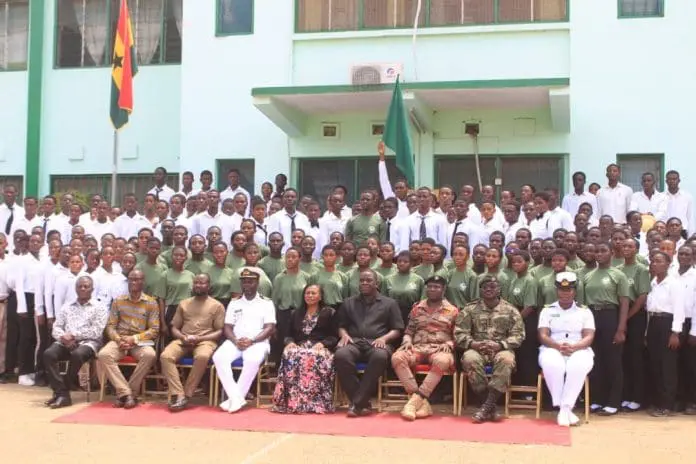Cadet Leadership Training Participants In A Group Photograph With Some Dignitaries
The annual celebration of Indian heritage at Accra Sports Stadium drew over 3,000 attendees in late October 2024, showcasing how cultural diplomacy continues strengthening bonds between Ghana and India. The festival, organized by India’s High Commission alongside 14 Indian regional associations in Ghana, offered more than colorful performances and authentic cuisine. It underscored a partnership rooted in decades of mutual respect and growing economic collaboration.
Manish Gupta, India’s High Commissioner to Ghana, welcomed guests by emphasizing culture’s unique power to unite nations. He described the gathering as more than entertainment, noting it represented values both countries cherish. The festival coincided with Diwali, the Festival of Lights symbolizing renewal and hope, adding deeper significance to the celebration. According to Gupta, recent high level diplomatic engagement, including Prime Minister Narendra Modi’s historic July 2025 visit to Ghana, has provided fresh momentum for bilateral cooperation.
The Prime Minister’s visit marked the first bilateral trip by an Indian leader to Ghana in over three decades. Modi’s July stopover included meetings with President John Dramani Mahama, addressing Parliament, and receiving Ghana’s highest honor, the Companion of the Order of the Star of Ghana. That visit set the stage for expanded cooperation across trade, technology, healthcare, and cultural exchange, with multiple memoranda of understanding signed between the two nations.
Dzifa Gomashie, Ghana’s Minister of Tourism, Culture, and Creative Arts, used the festival platform to acknowledge Indian businesses’ substantial contributions to Ghana’s economy. She specifically praised Indian owned restaurants and companies for creating employment opportunities and providing skills training for young Ghanaians. The Minister noted that for five consecutive years, India has sponsored programs sending young Ghanaians abroad to enhance their creative capabilities.
What makes this relationship particularly interesting is how it operates on multiple levels simultaneously. While diplomats sign agreements and trade ministers discuss import quotas, something quieter has been happening in Ghanaian homes and restaurants. Bollywood films have influenced local fashion choices. Indian television dramas have introduced new storytelling styles. Recipes have crossed borders, creating fusion cuisine that wasn’t planned by any committee.
Madam Gomashie articulated what many Ghanaians already experience daily: Indian cultural products have become part of Ghana’s social fabric. This cultural crossover generates economic benefits flowing both directions, she explained, creating markets and opportunities that formal trade agreements alone couldn’t establish. The integration feels organic rather than imposed, which probably explains its staying power.
The historical foundation runs deeper than recent initiatives suggest. India established one of the first diplomatic missions in the Gold Coast before Ghana’s independence in 1957, a gesture reflecting Jawame Nkrumah and Jawaharlal Nehru’s shared vision. Both leaders co founded the Non Aligned Movement, positioning their nations as voices for developing countries during the Cold War era. That philosophical alignment has evolved into practical cooperation spanning multiple sectors.
India has emerged as one of Ghana’s major trading partners, with over $2 billion in Indian foreign direct investment by 2021, according to Ghana’s Investment Promotion Center. The relationship encompasses pharmaceuticals, infrastructure development, agricultural machinery, and renewable energy projects. Through India’s EXIM Bank, development financing supports initiatives across multiple sectors. The African Continental Free Trade Area headquarters in Accra positions Ghana strategically for India’s broader African engagement.
Festival performances illustrated cultural fusion firsthand. Ghanaian artists performed Bollywood choreography with local interpretations, creating something neither purely Indian nor wholly Ghanaian. The INDIGHA Band, comprising Indian and Ghanaian musicians, blended traditional beats from both cultures, demonstrating how artistic collaboration can transcend national boundaries. These weren’t token gestures toward diversity but genuine creative partnerships producing new artistic expressions.
Beyond entertainment, the festival featured cultural exhibits showcasing Indian artifacts, traditional attire, jewelry, and artistic heritage. Food vendors offered everything from spicy street snacks to elaborate sweets, introducing attendees to culinary traditions many had only encountered through restaurants. Business stalls provided networking opportunities, connecting entrepreneurs from both communities.
Both officials agreed tourism and creative arts represent significant untapped potential. The Minister reaffirmed her ministry’s commitment to partnerships generating jobs and fostering innovation. The High Commissioner pledged continued support for cultural and skills development initiatives benefiting Ghanaian youth. These aren’t just diplomatic pleasantries. With Ghana positioning itself as West Africa’s gateway and India seeking to deepen African partnerships, concrete opportunities exist for expanded collaboration.
The timing matters. As global power dynamics shift and developing nations seek partnerships beyond traditional Western allies, the Ghana India relationship offers a model. It’s built on historical solidarity, sustained through practical cooperation, and enriched by genuine cultural exchange. Neither nation dominates the other. Both benefit from what the other offers.
For the thousands who attended that October evening, India Fest provided entertainment and connection. For volunteers who spent months organizing logistics, it represented commitment to community. But for both nations, the festival served as a reminder that sometimes the strongest international bonds aren’t forged through formal channels alone. They’re built through shared meals, artistic collaboration, and recognizing common humanity across continents.
What began as diplomatic recognition before Ghana’s independence has matured into multifaceted cooperation touching education, entrepreneurship, healthcare, and creative industries. Indian traditions have woven into Ghana’s social and economic landscape not through imposition but through genuine appeal and practical value. That organic integration suggests this partnership has room to grow in ways neither country might fully anticipate.
Images are for reference only.Images and contents gathered automatic from google or 3rd party sources.All rights on the images and contents are with their legal original owners.

